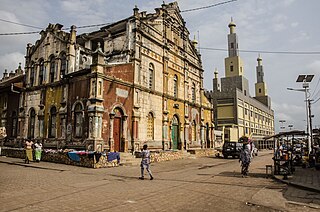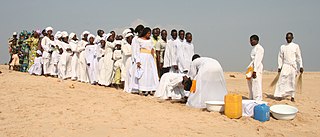
Benin, officially the Republic of Benin, and also known as Dahomey, is a country in West Africa. It is bordered by Togo to the west, Nigeria to the east, Burkina Faso to the north-west, and Niger to the north-east. The majority of its population lives on the southern coastline of the Bight of Benin, part of the Gulf of Guinea in the northernmost tropical portion of the Atlantic Ocean. The capital is Porto-Novo, and the seat of government is in Cotonou, the most populous city and economic capital. Benin covers an area of 114,763 km2 (44,310 sq mi), and its population in 2021 was estimated to be approximately 13 million. It is a small, tropical country. It is one of the least developed, with an economy heavily dependent on agriculture, and is an exporter of palm oil and cotton. Some employment and income arise from subsistence agriculture.

Porto-Novo is the capital and second-largest city of Benin. The commune covers an area of 110 square kilometres (42 sq mi) and as of 2002 had a population of 223,552 people.

The Celestial Church of Christ (CCC) is a Pentecostal church in the Aladura movement, which was founded by Samuel Oshoffa on 29 September 1947 in Porto-Novo, Benin. It has spread from West Africa to countries in Europe, such as Belgium, France, and the United Kingdom, but a number of its parishes are located in Nigeria, particularly in Lagos and Ogun State.

The National Library of Benin is the legal deposit library for Benin. Originally chartered in November 1975 and located in Ouidah, the library moved to a purpose built unit in the Ouando neighbourhood of Porto-Novo during the 1980s.

Albert Tévoédjrè was a Beninese writer and politician. He was Information Minister of Dahomey from 1960 to 1963.
La Presse Porto-Novienne was a French language weekly republican socialist newspaper published from Porto-Novo, Dahomey. The newspaper was founded in 1931 by Vincent Moreira Pinto. It carried subtitles in Yoruba language, and had a Yoruba language section.

Kojo Tovalou Houénou was a prominent African critic of the French colonial empire in Africa. Born in Porto-Novo to a wealthy father and a mother who belonged to the royal family of the Kingdom of Dahomey, he was sent to France for education at the age of 13. There he received a law degree, medical training, and served in the French armed forces as an army doctor during World War I. Following the war, Houénou became a minor celebrity in Paris; dating actresses, writing books as a public intellectual, and making connections with many of the elite of French society.

Jean-Marie Bayol was a French army doctor, colonial administrator and politician.
The following is a timeline of the history of the city of Abidjan, Ivory Coast.

Henri Calloc'h de Kérillis was a French aviator, reporter, writer and politician. A hero of World War I, he traveled widely in the 1920s, and wrote several books about his adventures. He became a journalist, then entered politics as an independent Republican. He was right-wing, conservative and profoundly nationalist. He was hostile to the parties that favored appeasement of Germany in the lead-up to World War II, and went into exile rather than be arrested after the armistice of July 1940. At first a strong supporter of Charles de Gaulle and his Free French, he later fell out with de Gaulle too. He spent the last years of his life in voluntary exile in the United States.
La Voix du Dahomey was a newspaper that was important in attempting to resist French colonial rule in Dahomey. The paper was published fortnightly between 1927 and the 1950s with an early circulation of only about 2000 but with a much larger readership and influence. Criticism of France was hidden beneath effusive protestations of loyalty to Paris. In 1936, the editors and directors of the paper were brought before a court by the colonial powers.
Le Guide du Dahomey was a short-lived but influential newspaper in Dahomey. The paper was published weekly from Cotonou between 1920 and 1922 over 88 issues under the editorship of Dorothée Lima and Jean Adjovi. Its critical tone and regular production paved the way for the expansion of Dahomean media from the 1920s onwards.
Dorothée Joaquim Lima was a newspaper editor and publisher in Dahomey who was instrumental in the development of news media in Dahomey during the French colonial era. With Jean Adjovi he edited the influential but short-lived Le Guide du Dahomey (1920-22). Later, he replaced Jean Adjovi as the editor of La Voix du Dahomey.
The following is a timeline of the history of the city of Lomé, Togo.
The following is a timeline of the history of the city of Cotonou, Benin.
Louis Hunkanrin was a Dahomeyan writer, educator, journalist, and politician. He was one of the earliest critics of French colonial power in his country, later renamed Benin.
Hélène d'Almeida-Topor was a French historian and university professor of contemporary history.

Benin–Turkey relations are the foreign relations between Benin and Turkey. Turkey has an embassy in Cotonou since 2014, while the Beninois embassy in Ankara opened in 2013, however the embassy was closed in 2020.

Beninese nationality law is regulated by the Constitution of Benin, as amended; the Beninese Nationality Code, and its revisions; the Family Code; and various international agreements to which the country is a signatory. These laws determine who is, or is eligible to be, a national of Benin. The legal means to acquire nationality, formal legal membership in a nation, differ from the domestic relationship of rights and obligations between a national and the nation, known as citizenship. Beninese nationality is typically obtained under the principle of jus sanguinis, i.e. by birth in Benin or abroad to parents with Beninese nationality. It can be granted to persons with an affiliation to the country, or to a permanent resident who has lived in the country for a given period of time through naturalisation.









